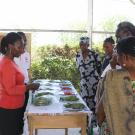Research article in the UN ESCAP's Centre for Alleviation of Poverty through Sustainable Agriculture (CAPSA) newsletter by Lisa Kitinoja with The Postharvest Education Foundation about postharvest losses and technologies to develop a model dissemination strategy for those postharvest technologies which most likely will promote sustainable agricultural development for smallholder horticultural farmers.
Introduction: Field observations over the past 40 years have reported that 40 to 50 per cent of horticultural crops produced in developing countries are lost before they can be consumed, mainly due to high rates of bruising, water loss and decay during postharvest handling (Kitinoja, 2010; Ray and Ravi, 2005). Losses can also show up as decreased nutritional quality or decreased market value. Reducing postharvest losses for fresh produce has been demonstrated to be an important part of sustainable agricultural development efforts to increase food availability (Kader, 2005), but only 5 per cent of funding for horticultural development efforts has assisted postharvest improvements, whereas 95 per cent has assisted efforts to increase production (Kader and Rolle, 2004). Literature reviews indicate that only one in 2000 agricultural development projects during the past 10 years has focused on postharvest horticulture (USAID, World Bank, UNFAO and DEVEX databases), even though an estimated 10-20 per cent of all farmers produce horticultural crops (Weinberger and Lumpkin, 2005; FAOSTAT, 2004). Unpublished evaluation reports on completed projects identified significant failures due to the over-reliance on production oriented activities, the lack of adequate training on postharvest handling practices, and slow or no development of appropriate postharvest infrastructure (see JICA's sponsorship of the Horticulture Crops Development Authority in Kenya; Diversified Agricultural Support Project (DASP) in Uttar Pradesh, India, of the World Bank; USAID projects Agricultural Exports and Rural Incomes, Horticulture (AERI-Hort) in Upper Egypt, Growth-oriented Microenterprise Development (GMED) in Maharashtra, India, and Agribusiness Market and Support Activity (AMARTA) in Indonesia).
In 2009 postharvest specialists initiated a project to document current levels of postharvest losses for small farmers in sub-Saharan Africa and India, then identify and test potential solutions. Project leaders comprised of postharvest specialists from the World Food Logistics Organization (WFLO) and the University of California at Davis (UC Davis) led a large team of collaborating partners based in Africa, India and the United States. The four countries of Benin, Ghana, India and Rwanda were selected based upon the wide variety of climates they had and horticultural crops they grew.

